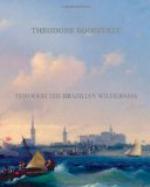Manaos is a remarkable city. It is only three degrees south of the equator. Sixty years ago it was a nameless little collection of hovels, tenanted by a few Indians and a few of the poorest class of Brazilian peasants. Now it is a big, handsome modern city, with Opera house, tramways, good hotels, fine squares and public buildings, and attractive private houses. The brilliant coloring and odd architecture give the place a very foreign and attractive flavor in northern eyes. Its rapid growth to prosperity was due to the rubber trade. This is now far less remunerative than formerly. It will undoubtedly in some degree recover; and in any event the development of the immensely rich and fertile Amazonian valley is sure to go on, and it will be immensely quickened when closer connections are made with the Brazilian highland country lying south of it.
Here we found Miller, and glad indeed we were to see him. He had made good collections of mammals and birds on the Gy-Parana, the Madeira, and in the neighborhood of Manaos; his entire collection of mammals was really noteworthy. Among them was the only sloth any of us had seen on the trip. The most interesting of the birds he had seen was the hoatzin. This is a most curious bird of very archaic type. Its flight is feeble, and the naked young have spurs on their wings, by the help of which they crawl actively among the branches before their feathers grow. They swim no less easily, at the same early age. Miller got one or two nests, and preserved specimens of the surroundings of the nests; and he made exhaustive records of the habits of the birds. Near Megasso a jaguar had killed one of the bullocks that were being driven along for food. The big cat had not seized the ox with its claws by the head, but had torn open its throat and neck.
Every one was most courteous at Manaos, especially the governor of the state and the mayor of the city. Mr. Robiliard, the British consular representative, and also the representative of the Booth line of steamers, was particularly kind. He secured for us passages on one of the cargo boats of the line to Para, and thence on one of the regular cargo-and-passenger steamers to Barbados and New York. The Booth people were most courteous to us.
I said good-by to the camaradas with real friendship and regret. The parting gift I gave to each was in gold sovereigns; and I was rather touched to learn later that they had agreed among themselves each to keep one sovereign as a medal of honor and token that the owner had been on the trip. They were a fine set, brave, patient, obedient, and enduring. Now they had forgotten their hard times; they were fat from eating, at leisure, all they wished; they were to see Rio Janeiro, always an object of ambition with men of their stamp; and they were very proud of their membership in the expedition.
Later, at Belen, I said good-by to Colonel Rondon, Doctor Cajazeira, and Lieutenant Lyra. Together with my admiration for their hardihood, courage, and resolution, I had grown to feel a strong and affectionate friendship for them. I had become very fond of them; and I was glad to feel that I had been their companion in the performance of a feat which possessed a certain lasting importance.




